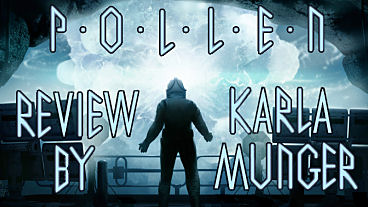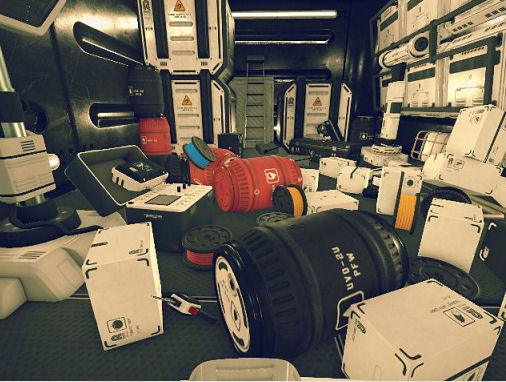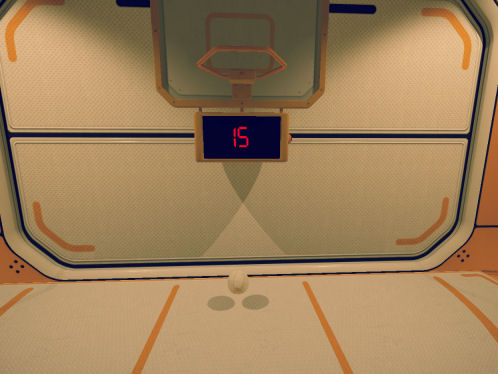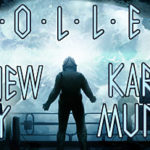
P.O.L.L.E.N. Review
This game can be quite effort-intensive and time-consuming, but if you rush through it and play it only once, I can almost guarantee you won’t like it







Genre: Mystery/Sci-Fi Exploration Adventure
Release date: April 20, 2016
Note: P.O.L.L.E.N. supports Oculus Rift, currently in Beta; and HTC Vive. Being VR-deficient, I played the game on a wide-screen LCD monitor.
P.O.L.L.E.N. is a mystery sci-fi exploration game that represents indie studio Mindfield Games’ maiden effort. And this is the most labor-intensive review I’ve ever written.
I’ve spent a lot, and I do mean a LOT of time with P.O.L.L.E.N. I’ve done playthrough after playthrough. While in the game I’ve looked at, fiddled with, read and listened to everything I could get my hands on.
I’ve become flummoxed, confounded and frustrated. I’ve gone back over parts of the game repeatedly. I’ve made surprising discoveries. I’ve engaged in silly (but fun) behavior. And I’ve given the narrative a substantial amount of thought.
You might wonder why I’ve devoted so much time and effort to this game and its review. Read on…
I completed my initial playthrough in a matter of hours and was left not liking the game. My major stumbling blocks consisted of the story, which didn’t make sense; and the ending, which REALLY didn’t make sense.
However, I also saw a game with a wonderful aesthetic, terrific lighting and sound, detailed graphics and great atmosphere.
So I had to ask myself something. Why would a developer make a game that looks and sounds as amazing as P.O.L.L.E.N. (more about that later), and deliberately throw a wrench into the works in the form of a potentially inaccessible story with a baffling ending?
I was therefore left with a nagging suspicion that there must be a lot more to P.O.L.L.E.N. than is readily apparent. If this were so, it meant that one could reach the end of the game successfully (and relatively quickly) without giving sufficient attention to its details.
As it turns out, I was correct on both counts. Bring on the additional playthroughs.
The narrative is strictly sci-fi — no horror, jump-scares, exploding creatures, big bad nasties or anything like that. It takes place in an alternate timeline in which JFK isn’t assassinated and the US and USSR join forces to go into space. Computers have remained in labs and there is no Internet (ouch).
The premise of P.O.L.L.E.N. is an interesting one. You play a technician sent to a research base on Saturn’s moon Titan, where one of the crew has disappeared and some sort of “event” has taken place. You’re to restore the base’s comm link with HQ, replace the missing crew member and investigate what’s happened.
Shortly after the game begins, you step out of your lander onto the surface of Titan. Mindfield has done an impressive job with Titan’s appearance and ambient sounds, and has even gone so far as to incorporate the moon’s lower-than-Earth gravity.
As you make your way to the research base, you see something odd occur (trying to avoid spoilers here). Almost simultaneously, a bad storm hits. Your helmet is bombarded with flying debris, and you must reach and enter the base before the integrity of your suit becomes totally compromised.
The facility is quite large. Within it, you’re able to switch back and forth between what I thought, at first, were two different points in time. As I played, however, I came to realize that these two states of existence are actually parallel realities, similar in some ways and different in others.
One reality is dark (at times, very much so) and trashed. Some areas, due to size and/or layout, rendered my flashlight relatively ineffective.
The other reality is, for the most part, bright, shiny and unmolested (at least until after I arrived; more about that later).
No explanation is given for this ability, which may be used only at certain pre-determined points.
You discover that not only is one crew member missing, all crew members are missing. There is no corporeal life in either reality. Something appears to have happened to them courtesy of an alien life-form they have been studying called The Entity.
Audio tapes recorded by the crew along with printed and handwritten material are scattered throughout the base. These provide clues concerning the nature of what might have occurred.
The tapes also yield insight into the crew members themselves, as does exploring their quarters. (BTW, I discovered that the tapes can be fast-forwarded while you’re listening to them. They sound pretty funny that way.)
As I’ve touched on previously, this is where the game truly distinguishes itself. Everything in its retro-futuristic environment is incredibly detailed, and you can interact with just about all of it.
Further, P.O.L.L.E.N. has some of the most accomplished physics I’ve ever encountered in a game. And the lighting effects are amazing.
Some items you find go into inventory, but a majority of them are for picking up, examining, possibly using in some way and/or putting back down. You can choose to drop them on the floor, throw them across the room, put them back where they were or take them someplace else. Items you’re unable to pick up, such as folding chairs and bags of trash, can be moved by kicking or punching them. This holds true in both realities.
Okay. At this point, I must make a confession. I love throwing, kicking, punching and messing things up. I had an absolute field day with this aspect of the game.
In fact, I spent as much time fiddling around with objects as I did playing the game. Maybe even more. I just couldn’t help myself. I left every room in a shambles. Here’s some of my handiwork…

I found some cute little toys shaped like bees that bounce and, when thrown, ricochet all over the place while making absurd squeaking sounds. I put one of them in the kitchen sink and gave it a bath. I also engaged in other silly activities such as trying to nuke a basketball in a microwave.
I crawled all over things. I jumped up on countertops, tables and instrument panels. I stood on bunks in Med Bay and jumped up and down. I grabbed throwable objects, climbed up on things before launching them and achieved some impressive trajectories. I’m like a little kid when it comes to stuff like this.
I suppose this kind of behavior could appear unprofessional to those who always take gaming seriously. But the way I see it, games are supposed to be fun. For me, this sort of thing is fun. The developer included it and I took advantage of it. I make no apologies.
Actually, I did discover something interesting about a certain object in the Research Lab by throwing things at it. This didn’t seem to mean anything, but one never knows. And that’s all I’m going to say.
Further, all of this juvenile behavior helped diffuse some of the frustration I felt over certain aspects of the game (more about that later).
But wait! There are also legitimate recreational activities to be found here. For instance, you can shoot hoops, which I found seriously addictive. Look! I made 15 baskets!

(Note: I discovered that making baskets with anything other than a basketball — a soup can or coffee mug, for instance — doesn’t count.)
You can also play darts, listen to rock music, run on a treadmill and punch a punching bag. You can even play a rudimentary videogame.
But alas, the graphics are not without their problems. For the most part, however, I had fun with these as well.
I encountered a lot of clipping. Items would become shardlike, overlap and/or go through other items. My head and body were able to pass through solid objects, and solid objects sometimes passed through me.
If I stood too close to something when I picked it up, it would go right up against my face.
Objects would also jitter. I came across several flashlights that turned out to be a real hoot in this regard. I could take one and push it up against things — say, objects on a shelf — and it would start jittering, shoving things around, knocking them over and/or pushing them onto the floor. Occasionally, a flashlight would fly out of my hand when I tried to put it down.
At one point, I set something down on a shelf and it immediately disappeared into the wall behind it. A few seconds later it came shooting out of a different part of the wall and landed on the floor.
Dropping and kicking objects could cause them to disappear and not return. Fortunately, none of the vanishing items I encountered was essential.
As the game was supposedly launch-ready when released, I found these things to be mildly off-putting at first. But it didn’t take long for me to start having fun with them. None of this behavior affected my advancing through the game (well, except maybe time-wise). Interestingly, it didn’t interfere with my sense of immersion either, and actually added to my enjoyment of the game.
Eventually, I was able to get enough of this foolishness out of my system to concentrate on playing P.O.L.L.E.N. in a more appropriate manner.
(Here’s a piece of advice: it’s not a good idea to jump into the reactor. Heh.)
P.O.L.L.E.N. offers a ton of gameplay options/adjustments. You can set up the game’s presentation and functionality just about any way you’d like. It’s extremely customizable.
There is one thing the game doesn’t have, however: user-initiated saves. Instead, the game autosaves at predetermined points. I consider this a big drawback.
I much prefer the ability to save at will, and as many times as I want. As a reviewer, I often want to revisit portions of a game I’ve just played. As a player, I like to save frequently in case I screw up a puzzle that might not reset, or have just completed a particularly arduous one. None of this is possible with autosaves.
Moreover, the game has only four save slots that are overwritten when full. If you want to start a new playthrough and all four slots are occupied, you must manually delete at least one autosave. I discovered that it’s actually better to delete all four if you’ve left some playthroughs uncompleted. In such a case, it becomes difficult to tell which save goes with which playthrough.
After discovering all of this, I decided that if I had to leave the game for any length of time and hadn’t just encountered a save point, I’d simply leave it running. This enabled me to pick things up precisely where I’d left them. Between doing this, spending so much time goofing around and doing so many playthroughs, I racked up a ridiculous number of in-game hours. I wonder if I could have set a Steam record?
Note: Once I got my bearings within the base (which took awhile; I have a terrible sense of direction), I was able to return to one of the locations in which I knew a save point would be generated. This enabled me to exit the game without losing anything. I just had to remember where I’d been before I did this so I could return to the proper area.
I discovered early-on that you can die in P.O.L.L.E.N. In fact, it’s one of the first things I did (remember that storm?). When this happens, you’re supposed to be returned to the last autosave. Unfortunately, I experienced one tremendous and frustrating breach of protocol (IOW, a Big Bug) in this regard.
I had just successfully negotiated a very tricky (for me) set of maneuvers that I’d previously failed at again and again, and ended up in an area I hadn’t seen before. As I was exploring, my character became physically stuck. As I fiddled with the controls in an effort to extricate myself from whatever was holding me back, I was dumped through the floor and sent falling through darkness, where I remained.
I repeatedly tried exiting, accessing the intermediary menu and going back in. But this only took me back into darkness.
Further, each time I accessed the menu, the buttons were messed up both graphically and functionally. They’d appear out of alignment. They’d jitter and jump around. At times, some of the menu’s three options were unresponsive.
To make matters worse, the most recent autosave had occurred before I’d made it through that tricky set of maneuvers.
After I’d finished smashing my head into a wall I decided to return to the Main Menu, resigned to losing my progress. Except the game wouldn’t let me do that either. After I clicked Exit to Menu, I became stuck on “Do you want to return to the main menu? You will lose all progress since the last checkpoint.” Both the Yes and No buttons were unresponsive.
P.O.L.L.E.N. doesn’t have much music, but what’s there is unobtrusive and enhances the mood of the game. Its ambient sounds — clicking switches, whirring machinery and whooshing doors; the way the sound of your footsteps changes when you walk from one surface to another, for instance — are outstanding. Everything sounds authentic and appropriate. You can even hear a wall clock as it ticks off seconds. This greatly adds to the feeling of immersion.
Voiceovers are fine with one exception, but that character doesn’t speak very much anyway. The voice heard most often belongs to Karen, the original missing crew member. Her delivery is quite nuanced. It drew me in and enabled me to feel her emotional turmoil. I was left truly wishing there was something I could have done to help her.
There is no hand-holding or spoon-feeding in P.O.L.L.E.N. I’ve never worked so hard to try to understand a game or devoted so much thought to a narrative in my life.
I’m glad I did, but I do wonder about the ending. The player is taken through a nine-minute cinematic that doesn’t look all that great and offers no apparent resolution to the story. This is followed by animated credits lasting close to five additional minutes. So for almost 14 minutes, the player just sits there and watches. That’s what I did, anyway. (The influence of 2001: A Space Odyssey is apparent both here and in other parts of the game.)
Due to the way the cinematic, credits and some of the gameplay are presented, I can’t help but suspect that P.O.L.L.E.N. has been constructed primarily for VR. On my monitor, this kind of presentation tends to fall flat (pun intended). I’m sure the things I’ve found visually lacking must look cool in VR. Maybe someone will play the game that way and let us know.
Now, concerning the game’s narrative and its ending (or lack thereof): I do believe that one can get as much out of P.O.L.L.E.N. as one is willing to put into it.
I also think some parts of the story are left for players to interpret. Further, I’m inclined to suspect that the developer may have thrown in some red herrings.
By doing things this way, Mindfield has taken a considerable risk and put a lot of faith and trust in the player.
Some will play the game only once, finish it in several hours (as I did with my first playthrough) and probably not think much of it, as happened to me as well.
But I don’t know how many would be willing to return to it repeatedly in hopes of discovering more. Aye, there’s the rub.
A developer can create an absolutely wonderful game, but if a player has to dig through too many layers of narrative and engage in thought to the point of brain-cramps in an effort to understand it, I’d say that few people are likely to discover its wonderfulness.
So if you want to enjoy P.O.L.L.E.N., here’s what I suggest: (1) Take your time; (2) Pay attention to every detail offered by both the objects you find and the environment itself; (3) Look at/read/listen to everything you can find (even if you think it can’t possibly matter) and (4) Be prepared to do a lot of thinking. You’ll be surprised at the number of things you can discover that aren’t readily apparent.
I’m not saying this will be easy. As I’ve already mentioned, it can be quite effort-intensive and time-consuming. But if you rush through the game and play it only once, I can almost guarantee you won’t like it.
As previously touched on, it’s possible to complete P.O.L.L.E.N. without having found all notes, listened to all tapes, examined every room, etc. However, this can leave the player with an incomplete picture of what has occurred. I think it bears repeating that you need to move through the game slowly, examine everything, pay attention to detail and keep your brain in gear.
Many thoughts have run through my head during the time I’ve spent with this game. I’ve developed definite ideas about parts of it that had me perplexed at first. I’ve experienced a few Ah-Ha! moments. I’ve even managed to develop a feasible interpretation of the ending.
But I still have questions. One, in particular, has been gnawing on me (I’ll keep it to myself to avoid a possible spoiler). But that’s okay. For all I know, it’s one of those potential red herrings I’ve mentioned.
Perhaps I’ll re-play P.O.L.L.E.N. someday and more will become clear. If not, I can live with that.
Now, a few words to Mindfield Games. If you develop another game — and I hope you do — please show players a little mercy. Don’t make it so difficult that only members of Mensa will be able to understand it without having to play it 15 times. I’m not saying it shouldn’t be a challenge, but please don’t ramp it up to brain-shredding level. Also, please test it sufficiently so it can be released with as few bugs as possible (ideally, with none at all). And if you ever need an extra tester, my hand is up. End of reviewer transmission.
Mindfield has promised patches that will address at least some of P.O.L.L.E.N.‘s bugginess. But even with its problems, and despite all the effort I’ve had to put into it, I’ve come to feel that at its core, P.O.L.L.E.N. is an amazing game. It’s certainly unlike anything I’ve ever played, and that’s saying something.
Hopefully, this review has provided sufficient information for you to decide whether or not P.O.L.L.E.N. is something you’d be interested in playing. Now, I just have to figure out what sort of grade to give it. Here goes…
+ Fastidiously crafted + Wonderful aesthetic and atmosphere + Unparalleled interactivity + Great physics system + Lots of gameplay options – No user-initiated saves – Only four save slots – Graphical anomalies – Buggy gameplay – Controls can be difficult – Narrative and ending not readily understandable |  |
GPU: Nvidia GTX 650 / AMD Radeon HD 7870
Memory: 4 GB RAM
OS: Windows 7 / DirectX 11
GPU: Nvidia GTX 980 / AMD 390 equivalent or greater
Memory: 8+ GB RAM
OS: Windows 10

Leave a Reply